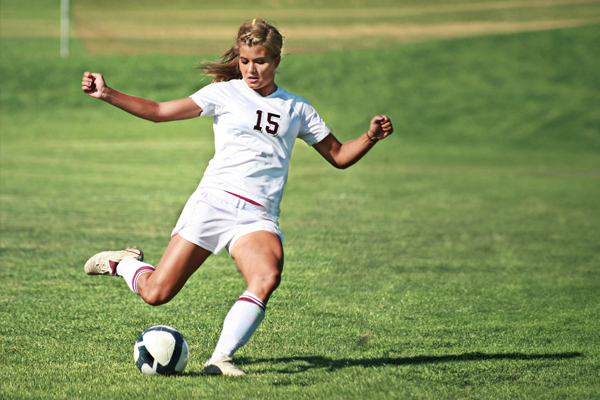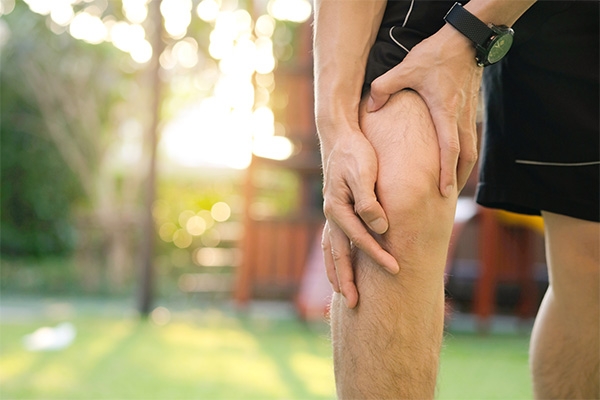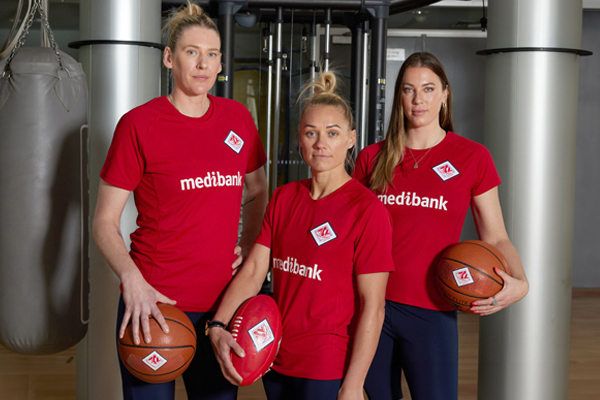Image: Lauren Jackson, Erin Phillips and Sara Blicavs have joined ACL United to highlight the impact ACL injuries have on female athletes.
Lauren Jackson is a household name: she's been playing basketball at an elite level for more than 20 years, with career highlights including Olympic medals and Women's National Basketball Association (WNBA) Championships.
But when Jackson reflects on her career, she says it’s not the memories, or the medals that stay with her, but how the experience has shaped her as a person.
“My early career really made me so resilient,” says Jackson. “It gave me this innate belief in my potential as a human, as an athlete, and now as a mother, and a working mum.”
Maybe resilience stands out because it hasn’t all been roses. Living away from family and friends, playing year-round to make a living, and the ups and downs of injuries have all taken their toll.
In 2016, a series of injuries made Jackson future in basketball look uncertain.
“I’d sustained a knee injury, and I tried to rush my rehab,” says Jackson. “I couldn’t see the end game, it was just ‘How do I get better tomorrow?’”
Three months later, Jackson gets injured again. “Turns out I’d ruptured my ACL. At that point I was so beaten down at being in that cycle of injury and recovery. The pain was pretty significant as well. I was ready to call it a day.”
Jackson retired from professional basketball, took a job with Basketball Australia and started a family in her hometown of Albury. But she couldn’t stay away from the court.

What is an ACL?
The anterior cruciate ligament (ACL) runs diagonally in the middle of the knee and provides rotational stability to the joint. It’s put under a lot of pressure during high-intensity sports and can sprain or tear. An ACL injury is often referred to as ‘doing a knee’.
“At first, for me, it was just about rehabbing every single part of my body that needed rehabbing,” says Jackson. “And then I started training again. It wasn’t about playing for Australia – I wanted to get back to playing at my local club with my friends, and for my kids to be around a sporting club."
“I think the whole exercise was more proving to myself, if I go through the process, if I take the necessary steps to rehab my body and look after it, I’ll be able to get through.”
In what many considered a remarkable comeback, she returned to the Australian women’s basketball team, the Opals, for the 2022 FIBA World Cup.
Stories like Jackson’s are the reason we love sport: an athlete that shows grit and determination and comes back against all the odds. It cements Lauren as one of Australia’s sporting legends.
But what if she never ruptured her ACL?
ACL United: the team no-one wants to join
Female athletes are up to 5 times more likely to sustain an ACL injury than male athletes, and to date, there has been little research into the reasons why, and the best prevention.
That’s why Medibank has brought together a new team: ACL United. The group’s collective mission is to raise awareness about the unique challenges faced by females who experience ACL injuries and the need for greater understanding, research and support.
The team includes a collection of local and international athletes who have pledged their support to help raise awareness of the impact of ACL injuries in women’s sport. The team includes renowned talent such as Taylor Ray, Nadia Nadim and Erin Phillips who have all experienced ACL injuries. And of course, Lauren Jackson.
“Giving the next generation the opportunity to hear from someone like me who has probably had most of these injuries motivated me to be a part of this campaign,” says Jackson.
“When I was young, I thought I was invincible. I didn’t warm up properly, I didn’t stretch, do the active recovery that I probably should have done.”
Her advice to young players?
“Get in good habits early. Learn how to train. Learn how to rehab early. How to prevent injuries early. So it just becomes habitual and you do it every single day.”
This kind of approach to injury prevention is exactly what’s behind research led by La Trobe University to prevent ACL injury amongst female Australian rules football players, with the support of the Medibank Better Health Foundation.
As part of the project, researchers have been rolling out Prep-to-Play. The program is based on the premise that the right warm up, and strength exercises can radically reduce the chances of ACL injuries.
Dr Brooke Patterson, the study’s Lead Researcher at La Trobe University, says the response to the program from female athletes has been heartening.
“Since its inception in 2020, we have successfully recruited 169 teams, surpassing our initial goal of 140,” says Dr. Patterson.
“In the past 2 years alone, an incredible 2,713 Australian rules female football players have willingly participated in our research project, which is an outstanding achievement and evidence of how important this issue is to women in sport.
“Together with Medibank, we are eager to share the findings later this year. The prevention of ACL injuries is crucial, particularly in women’s sports.”
The long term impacts of ACL injury
Avid sports fans would understand an ACL injury usually means the end of a season for a player, and sometimes the end of a career. Even with the best surgeons and rehabilitation program, it can take up to a year to get back on the court or field.
Dr. Jessica Choong, Medibank’s Medical Director of Research, Policy and Innovation, says there may be a mental barrier for female athletes returning to sport.
“For many young players or amateur athletes an ACL injury can stop them from getting involved back in team sports and sports clubs all together, missing out on a whole range of great health and social benefits that come with playing sport,” says Dr. Choong.
“For elite athletes, an ACL injury can represent the loss of so much potential – career opportunities, income. We know that the rates of ACL injury are too high, but further research and prevention programs can make a difference. Imagine if we had half or even a quarter of the number of female athletes out with ACL injuries?’
Not only that, preventing an ACL injury can have long-term impacts on women’s health, says Dr Choong.
“Someone that has had an ACL injury is more likely to develop osteoarthritis than someone who hasn’t, and they may develop osteoarthritis earlier compared with someone who hasn’t had an ACL injury. This could affect their quality of life, and result in them requiring a knee replacement down the track,” says Dr Choong.
“Preventing these injuries in the first place can have lifelong benefits, which is another reason this issue is so important to us.”
Follow @aclutd on Instagram for tips to prevent ACL injuries, and support for people recovering from injury. Or explore our Joint health hub for everything you need to know about preventing or minimising joint pain.

No Gap ACL Reconstruction program
We’re working with participating surgeons at participating hospitals to deliver no gap ACL reconstruction procedures. Eligible members could pay no out-of-pocket costs^ for an ACL reconstruction procedure.
